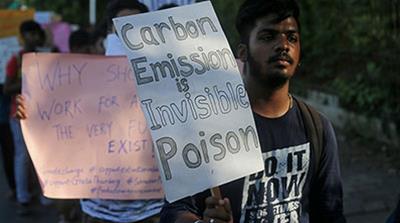An impact investing boom is under way
The ‘do good’ financial-services sector is experiencing growing pains.

With concerns about climate change, human rights and social justice dominating popular culture today, impact investing is experiencing a boom. The sector’s phenomenal growth is being driven by investors who are not only seeking a healthy financial return, but also aiming to meet social or environmental goals. These twin desires are creating new opportunities and challenges for the “do good” financial-services sector.
According to the most recent annual survey from the Global Impact Investing Network (GIIN), investors allocated more than $33bn towards more than 13,000 impact investments in 2018. The GIIN’s research shows they plan to continue – and more than 15,000 deals are expected this year.
Keep reading
list of 4 itemsCan ancient tunnels cool 21st-century heat in summer?
Why is Germany maintaining economic ties with China?
How one Mexican beach town saved itself from ‘death by tourism’
The GIIN’s 2019 survey also reaffirms the breadth of this niche financial sector. At the end of 2018, the overall size of the global impact investing market stood at $502bn.
The network admits that estimates about the sector’s size vary wildly, and that there are no hard and fast numbers.
“An accurate estimate of market size is in high demand,” Amit Bouri, cofounder and CEO of GIIN, wrote in the organisation’s Sizing the Impact Investing Market report. “Not only does it act as a central point of reference, but it enables comparison across various dimensions.”

While experts agree the number of investment funds is growing, actual estimates are not always easy to come by. In 2018, GIIN claimed there were more than 1,300 organisations holding impact funds. The same year, the Forum for Sustainable and Responsible Investment claimed 496 institutional investors, 365 money managers and 1,145 community investing financial institutions held impact investments, which it refers to as environmental, social and governance (ESG) assets under management.
Further complicating matters, not all of these funds are equal.
“This is an emerging challenge,” Jane Ambachtsheer, Global Head of Sustainability with BNP Paribas Asset Management, told Al Jazeera. “To date, there is no harmonised framework for measuring or reporting impact investment outcomes.”
Any organisation, company or fund can lay claim to the “impact” label. Some have been accused of “greenwashing” – misleading investors about the environmental benefits of their products and services. Add to that a massive generational wealth transfer – where young investors gain control of family wealth or are part of the newly “tech” rich – and it becomes clear why demand is soaring for vetting and rating the funds, firms and nascent companies that claim to be part of the impact club.
“The increasing demand for impact investing products and services has opened a new commercial avenue for asset managers, fund managers and service providers interested in this growing market,” Fiona Reynolds, CEO of the organisation Principles for Responsible Investment (PRI), told Al Jazeera.
Harmonisation needed
Investors usually have options for carrying out due diligence on a potential investment. Established rating agencies have traditionally offered a deeper look at the nuances of a particular fund, investment product or even a country’s economy.
But 10 years after its inception, impact investing has no universally agreed-upon playbook.
“To date, there is no harmonised framework for measuring or reporting impact investment outcomes,” Ambachtsheer explained.
Established rating agencies – such as Fitch Ratings, S&P Global and Moody’s – have taken some time to recognise “sustainability” as an investment theme and to track the resulting surge in impact investing, but they have made progress.
“Several rating agencies have started to score investment funds on ESG and impact aspects, which makes the discussion of impact investing even more commercially important for asset managers,” Reynolds said, referring to ESG standards. “Credit-rating agencies see the risks around ESG [and impact investing] issues. For example, [there is] climate change, which could lead to an environmental crisis that destabilises capital markets.”
Global consultancy KPMG refers to impact investing as a “rising force in the global economy”. In its 2018 Understanding Impact Investing report, the firm analysed guidelines used for ESG investments in dozens of countries. In its 2016 Carrots & Sticks report, which analyzes trends in the sustainability industry, KPMG identified nearly 400 different sustainability regulations, guidelines, codes of conduct, frameworks and other reporting tools that are being used across 64 countries. This suggests there is no uniformity within the sector.
To date, there is no harmonised framework for measuring or reporting impact investment outcomes.
Proceed with caution, despite healthy returns
Social impact investments could be more effective if clearer guidelines were in place, according to a recently released report by The Organisation for Economic Co-operation and Development.
The report, Social Impact Investment: The Impact Imperative for Sustainable Development, calls for international standards to be applied to collecting data and measuring impact. In the absence of an industry standard, there is concern about the potential for “impact-washing” or the misrepresentation of the social return of a financial investment.
Still, there is strong evidence that the so-called double bottom line returns on these investments – financial and gains – will continue to attract even small money investors.
According to GIIN, investors are now reporting performance consistent with both financial and impact expectations. GIIN’s 2018 Annual Impact Survey showed 82 percent and 76 percent of investors reported impact and financial performance, respectively, in line with their expectations, and 15 percent reported outperformance in both of these areas.
Solutions in the pipeline
Today, the sector is leaning on the United Nations (UN) to help define the social objectives of its investments. In 2015, the UN established global Sustainable Development Goals (SDGs) as part of a wider UN initiative to tackle the most critical issues facing society, such as eradicating poverty, gender inequality, and worldwide hunger. The SDGs offer a common language and framework for governments, non-profits, and private institutions to launch their individual initiatives.
Other active efforts to bring about standardisation are also under way.
In April, the International Finance Corporation – a division of the World Bank – brought together 58 organisations including banks, insurers and non-profits to form “Impact Principles”. This drafted set of guidelines aims to help direct impact investments.
There are also some upstarts attempting to disrupt – if not bring more transparency – to impact investing.
Boston-based Distilled Identity is one firm working towards more transparency in the impact investing space. Through its in-house tech platform, it works to mitigate risk and weed out fraudulent actors while offering a higher level of privacy to those seeking information on a particular business or individual.
For the greater good
Around the world, one can find investment opportunities that claim to be aligned with the UN’s SDGs and that therefore brand themselves as “impact investments”.
For example, a 10 million pound sterling ($12.5m) bond that funded the British non-profit Golden Lane Housing has provided adapted housing and related services for around 1,500 people with learning disabilities. This investment delivered a four percent return.

And in the developing world, investment firm Sarona Asset Management provides growth capital to small businesses in emerging markets including Egypt, India, Nigeria and Tunisia.
“It is easy to make a loose connection between what you’re investing in and one of the SDGs,” said Ambachtsheer. “This does not mean that you are making material and meaningful contribution to sustainable development. But while the stated goal is to benefit society, more metrics are needed to gauge how authentic they are.”
More work, she argues, needs to be done to allow investors and members of civil society to meaningfully identify those investments that are actually financing the SDGs.
“This is critically important,” said Ambachtsheer, “because the private sector’s active involvement is needed to deliver on the promise of the SDGs.”